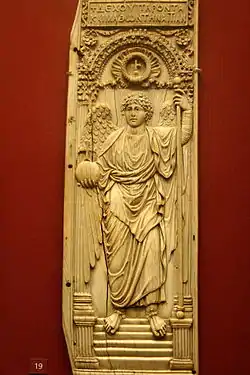| Archangel ivory | |
|---|---|
 on display in the museum | |
| Material | ivory |
| Size | 428 x 143 mm and 9 mm thick |
| Created | AD 525-550 |
| Place | Constantinople |
| Present location | Room 41 of the British Museum, London |
The Archangel ivory is the largest surviving Byzantine ivory panel, now in the British Museum in London. Dated to the early 6th century, it depicts an archangel holding a sceptre and imperial orb.
Description
The archangel is usually identified as Michael, and the panel is assumed to have formed the right part of a diptych, with the lost left half possibly depicting Emperor Justinian (reigned 527–565),[1] to whom the archangel would be offering the insignia of imperial power. The panel is the largest single piece of carved Byzantine ivory that survives,[1] at 42.9 × 14.3 cm (16 7/8 × 5 5/8 in).[2] It is, along with the Barberini ivory, one of two important surviving 6th-century Byzantine ivories attributed to the imperial workshops of Constantinople under Justinian,[3] although the attribution is mostly assumed due to the size and craftsmanship.[1]
The figure is depicted in a highly classical style, wearing Greek or Roman garb and with a youthful face and proportions conforming to the ideals of classical sculpture. The architectural space, however, is more typically Byzantine in its bending of spatial logic: the archangel's feet are at the top of a staircase that recedes from the base of the columns, but his arms and wings are in front of the columns.[2] The feet are also not firmly planted on the steps.
There is a Greek inscription at the top, translated variously. Translated as "Receive this suppliant, despite his sinfulness", it might be an expression of humility on the part of Justinian.[1] Interpreted as the beginning of an inscription that continues on the lost second panel, it may read, "Receive these gifts, and having learned the cause...".[2]
References
Further reading
- Weitzmann, Kurt, ed., Age of spirituality : late antique and early Christian art, third to seventh century, no. 481, 1979, Metropolitan Museum of Art, New York, ISBN 9780870991790; full text available online from The Metropolitan Museum of Art Libraries.